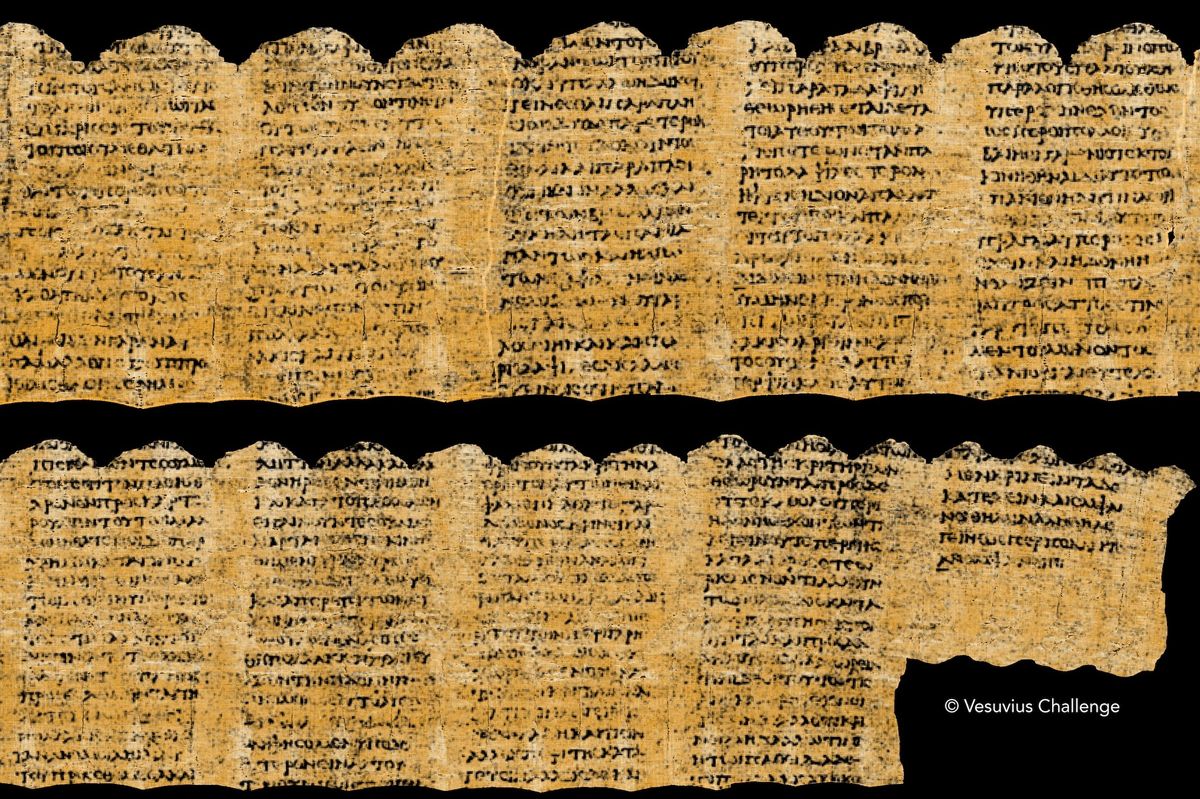College students use AI to decode ancient scroll burned in Mount Vesuvius
“Some of these texts could completely rewrite the history of key periods of the ancient world."

When Mount Vesuvius erupted in 79 C.E., it buried entire cities in volcanic materials. While Pompeii is the most famous site affected by the natural disaster, the nearby villa of Herculaneum was also laid to waste—including over 800 precious scrolls found inside Herculaneum’s library, which were carbonized by the heat, making them impossible to open and recover their contents.
Which brings us to the Vesuvius challenge, started by computer scientist Brent Seales and entrepreneurs Nat Friedman and Daniel Gross in March 2023. The contest would award $1 million in prizes to whoever could use machine learning to successfully read from the scrolls without damaging them.
On February 5, the prize-winning team was announced.The team consisted of three savvy college students— Youssef Nader in Germany, Luke Farritor in the US, and Julian Schilliger in Switzerland—working with each other from across the globe.
Each student had a prior individual accomplishment in the challenge before teaming up. Farritor first deciphered a word from the scroll ((ΠΟΡΦΥΡΑϹ, or “porphyras,” which means “purple” in ancient Greek), after which Nader was able to read multiple column from the scroll, in addition to Julian Schilliger creating 3D map renderings of the papyrus.Nader, Farritor and Schillinger eventually combined their talents to train machine-learning algorithms to decipher more than 2,000 characters. Contest organizers estimated a less than 30% success rate for even less characters.
So, what exactly did the scrolls say? Turns out, the ancient cultures were just as curious about what makes us truly happy in life as we are today.

From the Vesuvius Challenge/ scrollprize.org
The translated text, thought to be written by Epicurean philosopher Philodemus, appears to be a philosophical discussion on pleasure, and how it’s affected by things like music and food. And quite possibly “throwing shade” as stoicism by calling it “an incomplete philosophy because it has ‘nothing to say about pleasure.”
“We can’t escape the feeling that the first text we’ve uncovered is a 2,000-year-old blog post about how to enjoy life,” the Vesuvius Challenge website writes.
The first Vesuvius Challenge resulted in 5% of one scroll being read. For 2024, the goalpost has been moved to being able to read 90% of all four scrolls currently scanned, and to lay the foundation to read all 800 scrolls, and possibly other texts found at the Herculaneum library.
“Some of these texts could completely rewrite the history of key periods of the ancient world,” Robert Fowler, a classicist and the chair of the Herculaneum Society, told Bloomberg. “This is the society from which the modern Western world is descended.”
Using artificial intelligence to create a future has been a prime topic of conversation as of late, but this story is a great example of how AI can give us rare glimpses into the past as well. It's pretty incredible to think about how many ancient mysteries could be solved as technology continues to advance in the years to come.
But no matter how much knowledge we gain, it feels safe to say that pleasure might always an enigma.





 Rihanna Nails GIF
Rihanna Nails GIF

 Good luck trying to catch a gazelle.
Good luck trying to catch a gazelle. Chickens will eat just about anything.
Chickens will eat just about anything. There's actually a big difference between horses and zebras besides just the stripes.
There's actually a big difference between horses and zebras besides just the stripes. Stop Right There The End GIF by Freeform
Stop Right There The End GIF by Freeform